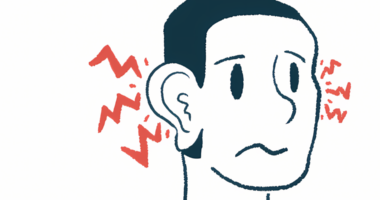Naming the monster: What my collection of symptoms really meant
The period of waiting before my diagnosis of early-onset Parkinson's

In the fall of 2012, I was moving fast. I had a big job and was becoming known in my industry. I traveled for work almost nonstop, working with clients and speaking at conferences. I was married to a great guy; we had the resources to enjoy beach vacations and ski trips. I was 35, and I was kicking butt and taking names.
But a monster was lurking.
My back had started to hurt. I didn’t worry too much at first, as I was getting older — or so my young brain thought! Besides, I didn’t get to the gym enough, my cardio was running through airports, and I slept on too many lousy hotel mattresses.
My primary care doctor sent me to physical therapy, and it helped the pain. But I still had this glitch in my walk. Every so often when I’d go to take a step, my foot would stay stuck to the ground, causing me to catch myself so I wouldn’t trip.
I then noticed that my left pinky finger started to shake when I typed. One evening at dinner, I reached for a glass of water, and I noticed I was moving so slowly that I had time to think about the fact that I was reaching for a glass. That was weird. And here I am, still reaching for the glass.
The road to diagnosis
In January 2013, I returned to my doctor, who performed what I now know to be a standard neurological exam: my hands were pushed and pulled, I followed the pen with my eyes, I touched my nose with my index finger, and so on. She didn’t love what she saw and asked if I wanted to see a neurologist. I said I wasn’t sure. She said, “Come back and see me in March, and we’ll decide.”
When I returned in March, my right pinky was shaking, too. I was noticeably slower and just bone tired, exhausted to the core. The monster was growing.
This time, my doctor strongly recommended I see a neurologist, even a movement disorder specialist. I didn’t realize it at the time, but besides my age, I was presenting the classic symptoms of Parkinson’s disease: slowness, tremors, rigidity, and gait or walking issues. I did make the appointment with the neurologist, but they couldn’t schedule me until September.
By the time I saw that specialist, I knew something was wrong because my symptoms kept progressing. But I couldn’t help my wishful thinking that I was making too big of a deal about these issues. It couldn’t be anything that bad. Maybe I wasn’t drinking enough water. Perhaps I was out of shape and overtired from traveling. Maybe I was taking medication that made me tremble. Perhaps I was just crazy.
Maybe denial isn’t just a river in Egypt.
After examining me that fall day in September 2013, the doctor sat me and my husband down and told us I had Parkinson’s. On the one hand, it was horrific news. I had a devastating, progressive neurological disease with no cure. On the other hand, the monster had a name. It couldn’t be stopped, but now that we knew what it was, there were things we could do. I wasn’t crazy, and I wasn’t alone. Parkinson’s disease might slow me down, but it wouldn’t stop me. And a monster with a name is much less scary than the unknown lurking.
As worrisome as that period of waiting was, I realize in hindsight how lucky I was to have been sent straight to a neurologist. I’ve since learned that many early-onset Parkinson’s patients struggle to get diagnosed promptly; many are misdiagnosed, or primary care physicians might ignore the symptoms because Parkinson’s disease is seen as an “old people” condition.
I’m one of the lucky ones. I get to share my journey with you in this column over the coming weeks and months. I try every day to be an “Unshakable Optimist” (which will be the name for this column) as we all, patients and caregivers, fight this monster and move toward a cure.
Note: Parkinson’s News Today is strictly a news and information website about the disease. It does not provide medical advice, diagnosis, or treatment. This content is not intended to be a substitute for professional medical advice, diagnosis, or treatment. Always seek the advice of your physician or another qualified health provider with any questions you may have regarding a medical condition. Never disregard professional medical advice or delay in seeking it because of something you have read on this website. The opinions expressed in this column are not those of Parkinson’s News Today or its parent company, Bionews, and are intended to spark discussion about issues pertaining to Parkinson’s disease.








Peggy Magner Holter
Thank you for this. I have been in exactly the same place for a few months now. I am 83 and recently retired from being a television field producer. I look forward to future columns.
Richard Wolf
Thanks for sharing your journey with us.
Lori DePorter
Thank you for sharing ! Our stories are very similar. Best of luck with your column.
Mary A Farnsworth
I was diagnosed with Parkinson's in January of 2023. Finally got the bad news after seeing 2 neurologist who had no ideal what was causing my tremors. Now I am taking large amounts of RYTARY and I don't think I Am any better. I'm at a loss of where to go next.